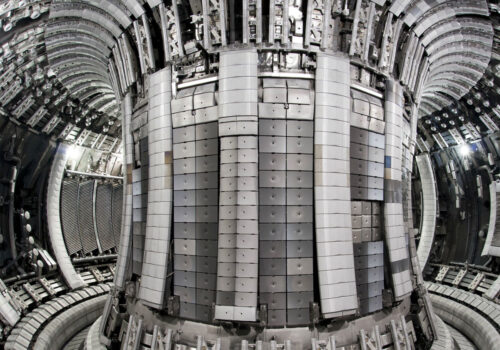GET UP TO SPEED
It’s causing a big reaction. On Wednesday, World Bank President Ajay Banga announced that the development bank’s board has lifted its longstanding ban on funding nuclear energy projects. The decision could surge funding for the emissions-free power plants in developing countries, and it comes amid a broader shift in attitudes toward atomic energy around the world. Below, the Atlantic Council’s top nuclear energy policy experts get to the core of the matter.
TODAY’S EXPERT REACTION BROUGHT TO YOU BY
- Jennifer Gordon: Director of the Nuclear Energy Policy Initiative and the Daniel B. Poneman chair for nuclear energy policy at the Atlantic Council’s Global Energy Center.
- Lauren Hughes: Deputy director of the Nuclear Energy Policy Initiative.
The decision
- “This is not the bank’s first foray into nuclear power as a means of promoting sustainable economic growth and shared prosperity,” says Lauren. In 1959, the bank issued a forty-million-dollar loan to help finance construction of Italy’s first nuclear reactor.
- The 2011 Fukushima Daiichi accident contributed to the World Bank enacting a de facto ban on funding for nuclear power, Lauren explains. This ban was then reiterated in 2013, when the bank said that “safety of nuclear facilities and non-proliferation are not in the [World Bank Group’s] areas of expertise.”
- This week’s reversal “follows a number of other similar decisions on nuclear energy,” Jennifer tells us, including the Declaration to Triple Nuclear Energy that more than twenty countries signed in December 2023, as well as recent decisions by the European Investment Bank, Germany, and Canada to boost nuclear power. Taken together, these decisions “indicate that nuclear is coming back into favor and being recognized for its ability to provide reliable baseload power.”
Sign up to receive rapid insight in your inbox from Atlantic Council experts on global events as they unfold.
The impact
- “Many emerging-market countries are interested in developing nuclear energy projects that could be prohibitively difficult to realize without financing,” Lauren explains, noting that upfront costs to build a power plant can run into the billions of dollars
- Lauren calls the bank’s decision a “pragmatic approach toward nuclear energy,” which recognizes “that the demand for reliable, affordable, clean energy will only increase in the coming decades” as populations grow in Sub-Saharan Africa, India, and Southeast Asia.
The frontier
- For the United States, the World Bank’s move “may indicate an eagerness to engage with the Trump administration on policy issues that the administration has indicated are at the top of its agenda,” Jennifer says. In late May, for example, the White House unveiled new executive orders on deploying advanced reactor technologies.
- Lauren adds that World Bank financing could help the United States “be more competitive against state-backed financing offers, especially from Russia and China.” By extension, the World Bank could reinforce the efforts of agencies such as the Export-Import Bank of the United States, the US International Development Finance Corporation, and the US Trade and Development Agency that are involved in nuclear projects in developing countries, she notes.
- For Jennifer, the bank overturning its ban should be “viewed as the next frontier in unlocking funding to support new nuclear builds and leveling the playing field with Russia and China.” However, she adds, it’s “not the final frontier, because it could send a signal to other international financial institutions that they should follow suit and also support nuclear projects.”

Global Energy Forum
June 17-18, 2025
The 9th Atlantic Council Global Energy Forum will take place in Washington, DC under the theme Collaboration, Competition, and Security: A new era of leadership shaping the future of the global energy system.
Further reading
Sun, May 25, 2025
What Trump’s new executive orders mean for the US nuclear energy industry
New Atlanticist By Jennifer T. Gordon
The US president signed four executive orders on May 23 intended to usher in an “American nuclear renaissance.”
Wed, May 14, 2025
The United States’ role in managing the nuclear fuel cycle
Issue Brief By Kemal Pasamehmetoglu
Global nuclear energy generation is likely to increase significantly in the next few decades. This expansion provides an opportunity for the United States to shape the global nuclear energy landscape and set a high bar for standards of safety, security, and nonproliferation for the nuclear fuel cycle.
Fri, Apr 4, 2025
Building a path toward global deployment of fusion: Nonproliferation and export considerations
Issue Brief By
With commercial fusion on the horizon, questions around the process for regulating fusion power plants have arisen.
Image: Power lines are seen at the nuclear-powered Vogtle Electric Generating Plant in Waynesboro, Georgia on August 13, 2024. Photo via REUTERS/Megan Varner.



